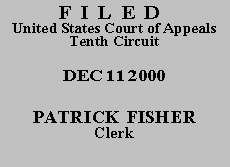

| In re: KARL WESLEY GREGORY
and NANCY LOU GREGORY,
Debtors, ______________________________ KARL WESLEY GREGORY and NANCY LOU GREGORY, Appellants, v. TRACY LYNNE ZUBROD, Chapter 7 Trustee, Appellee. |
|
Appellants seek review of an order of the Bankruptcy Appellate Panel (BAP), affirming the bankruptcy court's determination that a security officer's practice weapon is not exempt from the bankruptcy estate as a tool of the trade. Gregory v. Zubrod (In re Gregory), 245 B.R. 171, 174 (10th Cir. BAP 2000). We have jurisdiction under 28 U.S.C. § 158(d), and we affirm. We review questions of law de novo, but accept the factual findings of the bankruptcy court unless they are clearly erroneous. See Heape v. Citadel Bank of Independence (In re Heape), 886 F.2d 280, 282 (10th Cir. 1989).
Karl Wesley Gregory and his wife filed a Chapter 7 bankruptcy proceeding in which Mr. Gregory listed two of his seven firearms as exempt property. He uses a Glock Model 21 .45 caliber pistol in his employment as a security officer, and there is no question that this weapon is exempt. He also claimed that his Colt pistol, which he uses as a practice weapon, is a tool of the trade. The Chapter 7 trustee objected to this exemption, and the bankruptcy court conducted a hearing before ruling that there was no evidence indicating that the Colt was used and kept for the purpose of carrying on the debtor's trade or business. The debtors did not appear at the hearing.
Wyoming has opted out of the federal exemption scheme. See Johnston v. Barney, 842 F.2d 1221, 1221 (10th Cir. 1988); Wyo. Stat. § 1-20-109. Accordingly, the BAP held that this issue requires an analysis of Wyoming law regarding exempt property. See In re Gregory, 248 B.R. at 173.
The Wyoming statute governing the exemption at issue here provides that:
The tools, team, implements or stock in trade of any person, used and kept for the purpose of carrying on his trade or business, not exceeding in value two thousand dollars ($2,000.00) . . . are exempt from levy or sale upon execution, writ of attachment or any process out of any court in this state.
Wyo. Stat. § 1-20-106(b).
Considering this statute, the BAP determined that the bankruptcy court was correct in finding that the Colt pistol is not a tool of the debtor's trade because it is "not a means by which the Debtor's business is carried on." In re Gregory, 245 B.R. at 174. This is a factual determination. See Cent. Nat'l Bank & Trust Co. of Enid, Okla. v. Liming (In re Liming), 797 F.2d 895, 902 (10th Cir. 1986) ("[w]hether an implement is used in a bankrupt's 'trade' is a fact question based on an individual's particular circumstances."). And, although exemption statutes are to be construed liberally, "the Wyoming Supreme Court [has] recognized that a court is limited in its application for an exemption statute by what the terms of that statute can fairly be said to embrace." Johnston, 842 F.2d at 1223.
Mr. Gregory argues that the Trustee would have the court read into the Wyoming statute a requirement that an implement be necessary or required and would "require a showing that the property is necessary for the debtors' business or trade." Appellant's Br. at 8; see Lindell-Heasler v. Dinneen (In re Lindell-Heasler), 154 B.R. 748, 751 (D. Wyo. 1992) ("There is no requirement in the Wyoming exemption statutes that property be necessary. . . ."). To the contrary, neither the bankruptcy court nor the BAP required, either implicitly or explicitly, that the debtor must show that an implement is necessary before it could be exempt as a tool of the trade.
In fact, both courts followed the language of the statute, which specifically requires that a tool be "used and kept for the purpose of carrying on [a person's] trade or business." Wyo. Stat. § 1-20-106(b) (emphasis added). The bankruptcy court found no evidence that the Colt was used or kept for carrying out the debtor's business. Appellant's App. at 3. Likewise, the BAP found that the Colt "is not used directly in the performance of [the debtor's] duties as a security officer." In re Gregory, 245 B.R. at 174. Indeed, Mr. Gregory concedes that the Colt pistol is used only as a practice weapon and that he does not carry it during work hours. Appellant's Br. at 3. He further agrees that the pistol "may not be 'necessary' for the performance of his day to day employment duties," but suggests "it may in fact be necessary to maintain his proficiency in [his] job." Id. at 11. He urges "that the appropriate standard for determining whether a tool is exempt is whether it assists in any manner the debtor in being more proficient, competent or efficient in carrying on his trade or occupation." Id. at 12. This argument fails for the simple reason this is not the showing that the exemption statute requires.
The BAP's finding that the Colt pistol was not used or kept for the purpose of carrying on the debtor's business or trade is not clearly erroneous. In addition, the BAP correctly applied Johnston in determining that the Colt pistol is not the "'means by which [Debtor's] business is carried on.'" Johnston, 842 F.2d at 1222 (citing Pellish Bros. v. Cooper, 38 P.2d 607, 609 (Wyo. 1934)).
AFFIRMED.
Entered for the Court
Circuit Judge
*. This order and judgment is not binding precedent, except under the doctrines of law of the case, res judicata, and collateral estoppel. The court generally disfavors the citation of orders and judgments; nevertheless, an order and judgment may be cited under the terms and conditions of 10th Cir. R. 36.3.